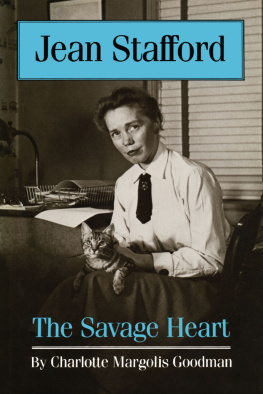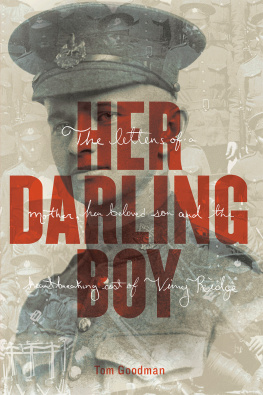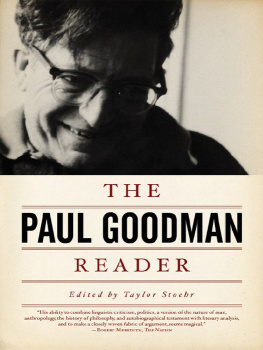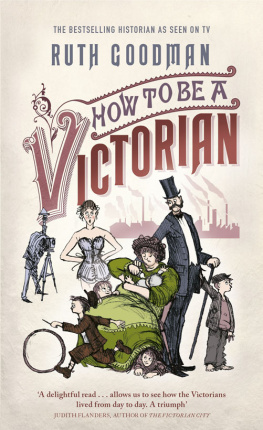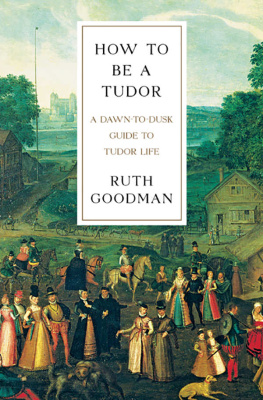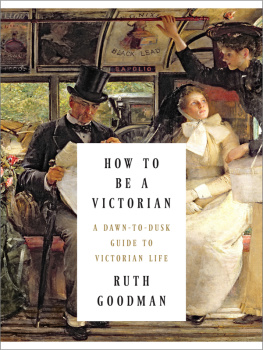Jean Stafford
The Savage Heart
Charlotte Margolis Goodman

UNIVERSITY OF TEXAS PRESS
Austin
Copyright 1990 by the University of Texas Press
All rights reserved
First edition, 1990
Requests for permission to reproduce material from this work should be sent to Permissions, University of Texas Press, Box 7819, Austin, TX 78713-7819.
See for acknowledgments of permission to use archival and previously published materials.
Library of Congress Cataloging-in-Publication Data
Goodman, Charlotte M. [date]
Jean Stafford: the savage heart / Charlotte Margolis Goodman. 1st ed.
p. cm.
Includes bibliographical references.
ISBN 0-292-74022-0 (alk. paper)
1. Stafford, Jean, 1915 . 2. Authors, American20th centuryBiography. I. Title.
PS3569.T2Z67 1990
813.54dc20
[B]
89-37293
CIP
Rev.
ISBN 978-0-292-75973-2 (library e-book)
ISBN 978-0-292-75974-9 (individual e-book)
DOI: 10.7560/740228
Writing is agony but it also is life itself.
JEAN STAFFORD, IN AN INTERVIEW BY ALICE DIXON BOND, BOSTON HERALD, JANUARY 27, 1952
Preface
I have read many moving lives of women, but they are painful, the price is high, the anxiety is intense, because there is no script to follow, no story portraying how one is to act, let alone any alternative stories.
CAROLYN HEILBRUN, WRITING A WOMANS LIFE
A DECADE AGO, when I first became acquainted with the fiction of the American writer Jean Stafford, I was surprised to discover that very few people had read her work. Why, I wondered, was her fiction far less renowned than that of some other women writers of her generation, despite the fact that she had been awarded the Pulitzer Prize for fiction in 1970? Why had she published no novels and almost no short stories since the fifties, though she did not die until 1979? In the forties, when her first two novels, Boston Adventure (1944) and The Mountain Lion (1947), were published, she was considered one of this countrys most promising fiction writers. In the fifties she published a well-received third novel, The Catherine Wheel (1952), and she regularly contributed short stories to the New Yorker. Yet only recently has Jean Staffords work begun to receive the sustained critical attention it merits. Today her writing is still less well known than that of Katherine Anne Porter, Mary McCarthy, Carson McCullers, Flannery OConnor, and Eudora Welty. Despite her impressive achievements as a writer, what most people probably think of first in connection with Jean Stafford is that she was the first wife of the celebrated and volatile American poet Robert Lowell.
Why are so many more women silenced than men? Tillie Olsen asks in Silences, a book describing the insurmountable difficulties that numerous writers have encountered. Although Jean Stafford was never silenced, as were many women writers of her generation whom Olsen mentions, she might have been more productive had she not been compelled to contend with poverty, a difficult family situation, role conflicts she was never able to resolve, emotional instability, and poor health. Moreover, she too, for the most part, In some ways more fortunate than many women writers of her generation, Stafford benefited from her association with several women who helped to promote her work. A number of influential men, moreover, also helped her to launch her literary career. Nevertheless, as did other women of her generation, she discovered how difficult it was for women to succeed in the public sphere, no matter how gifted or hardworking or ambitious they were. In fact, taking into consideration the trying private and public circumstances of her life, I find her literary achievement remarkable.
In 1944, critics hailed as a major literary event the publication of Jean Staffords first novel, Boston Adventure; in the fifties, when her wonderful short stories were published in the New Yorker, her fiction reached a wider audience; and in 1970, after her Collected Stories was awarded the Pulitzer Prize, many people who had never read her work before discovered what a splendid writer she was. Yet until recently much of her fiction was out of print. Furthermore, over time the ardor of some of her early admirers cooled. Alfred Kazin, for example, who had praised Boston Adventure when it first appeared, devotes only one sentence to Staffords work in his study of twentieth-century American writers, Bright Book of Life. Today it is largely due to the efforts of feminist scholars that Staffords fiction is being rediscovered by a new generation of readers.
One reason that Staffords work was neglected may be that her fiction is set in a variety of locations. Consequently, critics could not define her as a local color writer or identify her with a particular geographical region, as has been true of so many other American women writers. Staffords literary reputation might also have been adversely affected by her lack of productivity during the last two decades of her life. Between 1959 and 1979 she published only five short stories. Moreover, she never succeeded in completing The Parliament of Women, a novel on which she had been working for many years. Although she regularly contributed book reviews and essays to a variety of newspapers and periodicals to support herself, her reputation as a fiction writer declined.
Whatever the reasons for the neglect of Jean Staffords work, her novels, short stories, and essays certainly deserve to be better known. Adept at writing in both the elegant manner of a Wharton or a James and in the colloquial style of a Twain or a Welty, she sensitively and poignantly portrays the entrapment, alienation, and despair of her characters in beautifully crafted works notable for their subtlety, their wit, and their irony.
As Maureen Ryan has observed in her recently published study, Innocence Her female protagonists not only serve as exemplars of human estrangement in the modern world but also illustrate the difficulties encountered by women in particular. Jean Staffords best novel, The Mountain Lion, is a truly original double Bildungsroman whose disturbed young female protagonist, Molly Fawcett, is as memorable a creation as J. D. Salingers Holden Caulfield or Carson McCullerss Frankie Addams. Equally skillful as a short story writer, Stafford depicts in her short fiction the frustrations of precocious ten-year-old girls in small western towns, defiant young women, unhappy wives, and feisty octogenarians. Her best storiesIn the Zoo, A Country Love Story, The Echo and the Nemesis, The Interior Castle, Children Are Bored on Sunday, The End of a Career, and An Influx of Poetsare accounts of female experience as accomplished and as moving as the stories of Sarah Orne Jewett, Mary Wilkins Freeman, Willa Cather, Katherine Anne Porter, Flannery OConnor, and Eudora Welty.
When I first became interested in the work of Jean Stafford, I planned to write a critical study of her fiction. However, once I realized how closely intertwined her life and art were, I decided instead to write a literary biography that would both trace the evolution of her career and shed light on the vital connections between her life and her art.
My investigation of Staffords life has taken me to Boulder, Colorado, where she lived in her youth and where her papers are now located; to Boston, New York, Connecticut, and Maine; and, finally, to the eastern tip of Long Island, where she resided during the last years of her life. In the course of my research, I have encountered a fascinating though not always likable woman. An embittered alcoholic and neurotic, Stafford was quick to attack the stupidity, bad taste, and hypocrisy of others. However, though some considered her to be heartless and self-centered, many had not only great respect for her work but great affection for her. They respected her intellect, were amused by her caustic wit, and recognized how vulnerable and insecure she really was. I too have come to admire her formidable intelligence, her perceptiveness, her wit, her candor, her tenacity, and her unwillingness to compromise her high artistic standards. If I have not always approved of her actions, I have nonetheless tried to understand what motivated her behavior. Moreover, I have empathized with the conflicts she experienced as she tried to reconcile the often contradictory imperatives of her personal life and her career.
Next page
